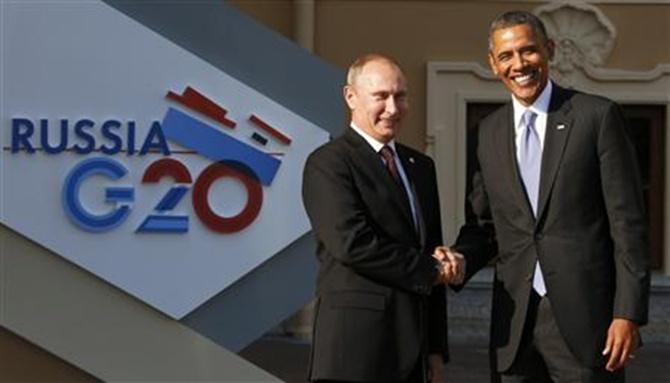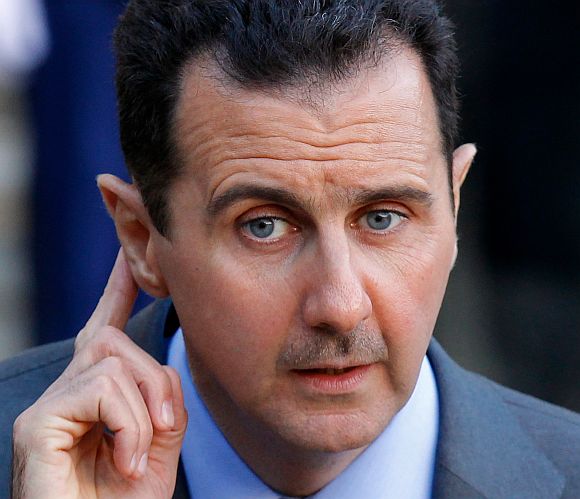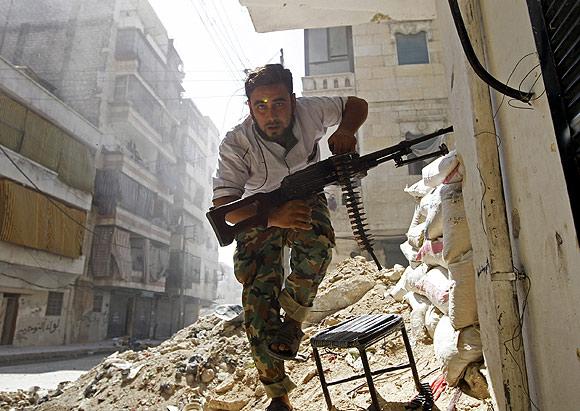 | « Back to article | Print this article |
Hopefully, Obama will appreciate the fierce urgency of now!
'What can one say about bleeding heart Uncle Sam whose visage is smudged with inerasable nuclear and chemical stains? His Syrian sob story sounds like the devil stammering out Scripture.'
M P Anil Kumar explains how the world could possibly resolve the Syrian crisis, and also protect oppressed peoples all over.
The present international model of States was midwifed by the Peace of Westphalia that wound up the Thirty Years’s War fought by the major European domains of that time. Signed in 1648, the Westphalian Accord recognised States as independent agents who had complete sovereignty over its territory.
Broadly, three tenets wove the Westphalian tapestry: Political self-determination; legal equality among States; non-interference. Poking your nose into others’s affairs was taboo.
In time, hegemonic States thumbed its nose at Westphalia. With the advent of gunboat diplomacy, the late 19th and 20th centuries witnessed all kinds of meddling. The sword held sway. As the American axiom goes: Might makes right. Ironically, Europe itself maimed its brainchild with the shared sovereignty concept that now binds the European Union!
The Rwandan genocide of 1994 in which at least 500,000 ethnic minority Tutsis were exterminated sickened the then UN secretary-general Kofi Annan into asking the champions who had winked at the hair-raising slaughter: When does the international community intervene for the sake of protecting hapless populations?
In response, the Canadian International Commission on Intervention and State Sovereignty released its report The Responsibility to Protect in December 2001. Its gist: Sovereignty is not absolute; international community has a responsibility to protect imperiled populations.
Under the rubric mass atrocities, it enumerates four crimes -- genocide, war crimes, crimes against humanity and ethnic cleansing -- as unacceptable.
If the State is remiss and bereft of compunction, The Responsibility to Protect urges the international community to nudge it to discharge its primary duty of protecting its people. If the state stays unmoved, then The Responsibility to Protect exhorts the international community to adopt coercive diplomatic, political, economic and social measures to compel the State to fall in line.
The Security Council can flag Chapter VII of the UN Charter and authorise military action as the last resort.
Like Nero, the Myanmar junta was accused of fiddling when the killer cyclone Nargis lay waste the Irrawaddy Delta in May 2008. When the junta dallied to let in international relief, activists hollered to invoke The Responsibility to Protect, but the The Responsibility to Protect charter was devoid of such a proviso. The clamour to broaden the scope of The Responsibility to Protect to include natural disasters boomed -- not just commission, but even acts of omission must necessitate international intervention. However, the argument is yet to be buttoned up.
The Responsibility to Protect, in essence, enshrines solidarity with the victims of atrocities, and embodies three strands: to prevent; to react; to rebuild. The World Summit in 2005 and the UN General Assembly in 2009 debated the framework. Resolutions were passed, but The Responsibility to Protect isn’t enforceable still.
The Responsibility to Protect, incidentally, is not equal to humanitarian intervention; when the State itself violates human rights, recourse to military force is intrinsically embedded in the latter. In fact, The Responsibility to Protect is devised to redress the appalling history of ‘humanitarian interventions’.
A key motive for global sheriff Uncle Sam not touching the Rwandan carnage with a barge-pole was the casualty count and the revolting visuals of American bodies being dragged through the streets of Mogadishu by the henchmen of Somali strongman Mohammed Aidid (October 1993). A coinage -- the Mogadishu Line -- entered the discourse thus.
The next time you hear an egghead utter ‘cross the Mogadishu Line’, it means the shifting of foreign-involvement-gears to combat operations from diplomacy/peacekeeping.
When we had a resolute leader in Indira Gandhi, India actually set a benchmark in humanitarian intervention and The Responsibility to Protect (decades before it was envisioned). The Indian response to the influx of 10 million East Bengali refugees, circa 1971, was admirable.
Having sat on the fence for ages, India now cannot find the footing to take a stand on global quarrels. Psst, why burn fingers in the searing Syrian stew?
Click NEXT to read further...
Gasser Assad, hands up!
The first slogan of the Syrian rebellion was cried out on the Ides of March 2011 in Deraa for the release of 14 detained schoolchildren. A conflict that ignited as civil unrest against the unendurable Ba’ath government of Bashar al-Assad has accreted assorted actors about the inaugural axis; it has widened and hardened into a savage Sunni vs Shiite/Alawite supremacy scuffle, the maelstrom sucking in the stalwarts, even the ilk of Hezbollah and Al Qaeda affiliates.
The strife is somewhat reminiscent of the Spanish civil war (July 1936 to April 1939) where Nazi Germany, Fascist Italy, Portugal, Soviet Union, Mexico rushed in. The embers of the Spanish civil war later combusted into a conflagration we call World War II. The Levant at present is a tinderbox; one spark can set off a blaze that could consume the Middle East, even shores afar.
Enter sarin gas. Enter Uncle Sam and sidekicks. After Iraq, any American evidence of ‘smoking gun’ will only evoke a yawn; it has as much face value as Dr Manmohan Singh’s claim of Assam residence.
The expose of British firms supplying the chemicals to produce sarin to Syria and British Prime Minister David Cameron pillorying the Assad regime takes the cake! What simulated outrage! Mr Cameron, Iago of Othello infamy would doff his hat at your duplicity. The West had swaggered as if it owned the moral compass. Boo!
What can one say about bleeding heart Uncle Sam whose visage is smudged with inerasable nuclear and chemical stains? His Syrian sob story sounds like the devil stammering out Scripture. Middle East-watchers are divided on what is unfolding in the Levant: it’s about Iran and Israel, reckons one circle; the others contend the sarin snarl is a Great Gas Game gambit.
Despite Vietnam, Somalia, Iraq, Afghanistan, the arsenal of guided missiles, smart bombs, super dreadnoughts, CrashPAD warhead-busters, still imbues the American elite with the false sense of power to browbeat the world into genuflection.
Anyone who uses chemical munitions should not go unpunished. By all accounts, Assad is a viper, but why not wait for the UN to indict and tag him for Dante’s seventh circle of hell?
American vigilantism is not the countermeasure. (If you may: Syria has yet to sign the 1993 Chemical Weapons Convention, but it’s a signatory to the 1925 Geneva Protocol that prohibits the use of chemical agents in war, which behoves Syria to answer for any violation; Assad and the Shabiha militias can be hauled for crimes against humanity, war crimes, you name it.)
There’s more than one way to skin a cat. The Russian president knows the strategic pressure points, and has stolen a march on his American counterpart. Syria has stirred Russia into rediscovering its Cold War intrigue, tricks and cunning; having outfoxed the Americans in the first round of the renewed game, President Putin is impatient to stake equal rank at the international head table.
Click NEXT to read further...
UN, lend Obama a fig leaf
Although his patron Russia has wangled probationary reprieve, it bears repeating that sabre-rattling won’t rattle battle-hardened tyrant Assad; it will only harden his bloody-mindedness.
If the US president is itching to pull the trigger, he must persuade the Security Council to rubber-stamp his licence to kill. The US cannot denounce the Syrian regime of breaching universal norms and then break the same norms it wants to defend.
So, Mr Obama, step off the bully pulpit, unclench your fist, extend your hand and reach out to the rest of the world.
No doubt, the suffering Syrian masses need to be shielded, supplied succour. Urgently. But, where is the mechanism for effective delivery? The UN has been rendered lame.
The United Nations, the international order created by the victors of World War II, remained more or less paralysed due to Cold War stasis. Post-Soviet Union, unchallenged, the US and its satellites, orbited the planet as standard-bearers of human rights and bombed the riffraff at will. (They did Kosovo, arguably, a good turn.) Now nursing bloodied noses, they are gradually losing the appetite for intervention as is evident from nay-saying Brits and feet-dragging Yanks. With China’s stars in the ascendant, the Sino-American rivalry will cripple the UN in the not-too-distant future.
In a way, things are looking up for tinpot despots. Vulnerable populace cannot be left unprotected. This Syrian imbroglio is an opportunity.
Pressing the ‘Pause’ button has given the US president a breather to reflect (also to figure out what’s up Russian sleeves). Its warts notwithstanding, I would plump for a democratic America to captain earth than a totalitarian People’s Republic. Better the known devil.
Mr Obama, why not shut down the hung-up UN, and reboot with a better operating system (read international order) driven by a vigorous sense of humanism, veto-less, not prone to crashes, which cannot be held hostage by superpower one-upmanship?
To fight the human plight, The Responsibility to Protect is a good template to build on. The present stipulations of The Responsibility to Protect can be touched up to make it less interventionist, a protocol sanctified and made legally binding.
Hopefully, President Obama will appreciate the fierce urgency of now.
Please read more about the incredible M P Anil Kumar here.
TOP photo features you missed last week
Click on MORE to see another PHOTO features...



